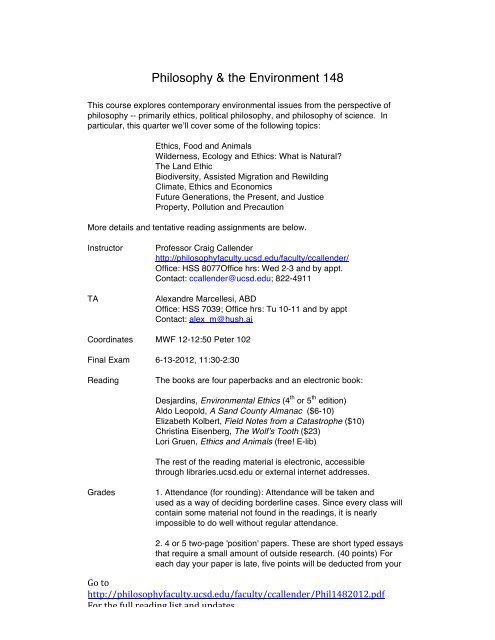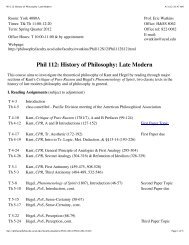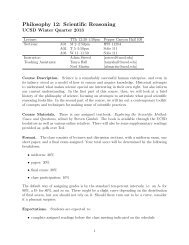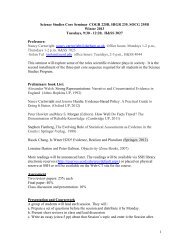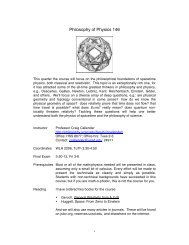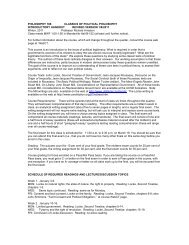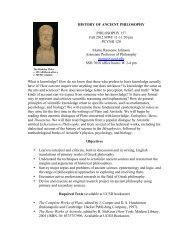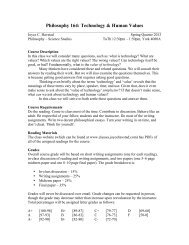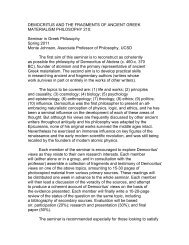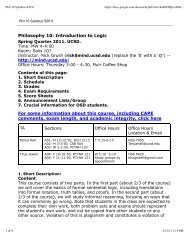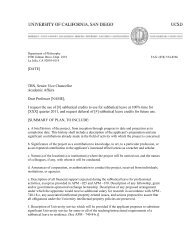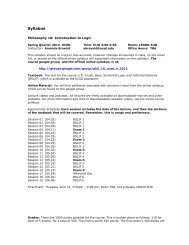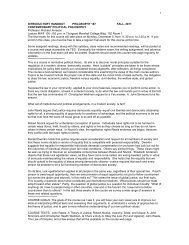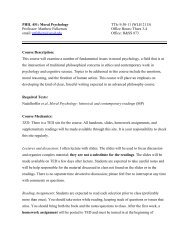Philosophy & the Environment 148 - UCSD Department of Philosophy
Philosophy & the Environment 148 - UCSD Department of Philosophy
Philosophy & the Environment 148 - UCSD Department of Philosophy
Create successful ePaper yourself
Turn your PDF publications into a flip-book with our unique Google optimized e-Paper software.
<strong>Philosophy</strong> & <strong>the</strong> <strong>Environment</strong> <strong>148</strong><br />
This course explores contemporary environmental issues from <strong>the</strong> perspective <strong>of</strong><br />
philosophy -- primarily ethics, political philosophy, and philosophy <strong>of</strong> science. In<br />
particular, this quarter weʼll cover some <strong>of</strong> <strong>the</strong> following topics:<br />
Ethics, Food and Animals<br />
Wilderness, Ecology and Ethics: What is Natural?<br />
The Land Ethic<br />
Biodiversity, Assisted Migration and Rewilding<br />
Climate, Ethics and Economics<br />
Future Generations, <strong>the</strong> Present, and Justice<br />
Property, Pollution and Precaution<br />
More details and tentative reading assignments are below.<br />
Instructor<br />
TA<br />
Pr<strong>of</strong>essor Craig Callender<br />
http://philosophyfaculty.ucsd.edu/faculty/ccallender/<br />
Office: HSS 8077Office hrs: Wed 2-3 and by appt.<br />
Contact: ccallender@ucsd.edu; 822-4911<br />
Alexandre Marcellesi, ABD<br />
Office: HSS 7039; Office hrs: Tu 10-11 and by appt<br />
Contact: alex_m@hush.ai<br />
Coordinates MWF 12-12:50 Peter 102<br />
Final Exam 6-13-2012, 11:30-2:30<br />
Reading<br />
The books are four paperbacks and an electronic book:<br />
Desjardins, <strong>Environment</strong>al Ethics (4 th or 5 th edition)<br />
Aldo Leopold, A Sand County Almanac ($6-10)<br />
Elizabeth Kolbert, Field Notes from a Catastrophe ($10)<br />
Christina Eisenberg, The Wolfʼs Tooth ($23)<br />
Lori Gruen, Ethics and Animals (free! E-lib)<br />
The rest <strong>of</strong> <strong>the</strong> reading material is electronic, accessible<br />
through libraries.ucsd.edu or external internet addresses.<br />
Grades<br />
1. Attendance (for rounding): Attendance will be taken and<br />
used as a way <strong>of</strong> deciding borderline cases. Since every class will<br />
contain some material not found in <strong>the</strong> readings, it is nearly<br />
impossible to do well without regular attendance.<br />
2. 4 or 5 two-page 'position' papers. These are short typed essays<br />
that require a small amount <strong>of</strong> outside research. (40 points) For<br />
each day your paper is late, five points will be deducted from your<br />
Go to <br />
http://philosophyfaculty.ucsd.edu/faculty/ccallender/Phil<strong>148</strong>2012.pdf <br />
For <strong>the</strong> full reading list and updates
point total.<br />
3. Exams: midterm (30 points), final (30 points)<br />
Fine Print<br />
In your homeworks, etc., all sources, including discussions with classmates, must<br />
be appropriately acknowledged. All answers given must be in your own wording.<br />
Closely paraphrasing or simply copying <strong>the</strong> work <strong>of</strong> o<strong>the</strong>rs (such as authors <strong>of</strong><br />
books or articles, or classmates) is not allowed and will be severely penalized. You<br />
must ask me in case you are uncertain whe<strong>the</strong>r something constitutes plagiarism.<br />
All forms <strong>of</strong> academic dishonesty will be immediately reported to <strong>the</strong> Academic<br />
Integrity Office. Students agree that by taking this course all required assignments<br />
will be subject to submission for textual similarity review to Turnitin.com for <strong>the</strong><br />
detection <strong>of</strong> plagiarism. All submitted papers will be included as source documents<br />
in <strong>the</strong> Turnitin.com reference database solely for <strong>the</strong> purpose <strong>of</strong> detecting<br />
plagiarism <strong>of</strong> such papers. Use <strong>of</strong> <strong>the</strong> Turnitin.com service is subject to <strong>the</strong> terms<br />
<strong>of</strong> use agreement posted on <strong>the</strong> Turnitin.com site. You must observe <strong>the</strong><br />
University’s Policy on Integrity <strong>of</strong> Scholarship, which can be found at http://wwwsenate.ucsd.edu/manual/appendices/app2.htm.<br />
Make-up exams (for midterm and<br />
final) will only be given under <strong>the</strong> most severe circumstances. The student who<br />
wishes to write a make-up exam must inform me (by phone or email) before <strong>the</strong><br />
exam takes place. In order to qualify for a make-up exam, appropriate evidence <strong>of</strong><br />
<strong>the</strong> most severe circumstances must be produced by <strong>the</strong> student. I will determine,<br />
in consultation with <strong>the</strong> student, what qualifies as appropriate evidence.<br />
Weeks 1-‐2 <br />
Ethics, Food and Animals <br />
You will be introduced to some basic ethical concepts and <strong>the</strong> <br />
main rival <strong>the</strong>ories, e.g., utilitarian and deontological <strong>the</strong>ories. <br />
To spice things up, we’ll apply <strong>the</strong>se <strong>the</strong>ories to questions <br />
about what we should eat and <strong>the</strong> moral status <strong>of</strong> non-‐human <br />
animals. <br />
Desjardins, chapters 2, 5, parts <strong>of</strong> 6 <br />
Gruen, chapters 1-‐3 <br />
Norcross, “Puppies, Pigs, and People” <br />
homepage.mac.com/anorcross/papers/Puppies.pdf <br />
Pollan, “Power Steer” michaelpollan.com/articles-archive/power-steer/ <br />
Jacquet, “Silent Water” <br />
jenniferjacquet.files.wordpress.com/2010/05/jacquet2009_eds.pdf <br />
Week 3 <br />
Wilderness, Ecology and Ethics: What is Natural? <br />
The Wilderness Act <strong>of</strong> 1964 enshrines our nation’s desire to <br />
preserve wilderness areas. What is a wilderness? How did <br />
this idea arise? Does it make sense? Should we seek to <br />
preserve or conserve wilderness, and why? Are <strong>the</strong>re <br />
ethically charged unintended consequences <strong>of</strong> doing so? <br />
Nicholls, Paradise Found www.press.uchicago.edu/Misc/Chicago/583402.html <br />
Desjardins, chapters 7 and 8 <br />
Go to <br />
http://philosophyfaculty.ucsd.edu/faculty/ccallender/Phil<strong>148</strong>2012.pdf <br />
For <strong>the</strong> full reading list and updates
Leopold, SCA, selections <br />
Price, "Hats Off to Audubon" <br />
www.audubonmagazine.org/features0412/hats.html <br />
Muir, "Hetch Hetchy Valley" (chapter 16, 1908) <br />
www.yosemite.ca.us/john_muir_writings/ <br />
Dowie, "Conservation Refugees" <br />
www.orionmagazine.org/index.php/articles/article/161/ <br />
Week 4 <br />
The Land Ethic <br />
Aldo Leopold wrote what many consider to be <strong>the</strong> finest <br />
work in environmental ethics and conservation, Sand County <br />
Alamanac. His thoughts on conservation, ethics, ecology and <br />
evolution , expressed in an understated yet beautiful prose, <br />
motivate many conservation biologists today. We’ll find out <br />
why and examine his thought. <br />
Leopold, SCA, continued selections <br />
Eisenberg, Wolfs’ Tooth, selections <br />
Week 5+ <br />
Wilderness, Ecology and Ethics: Biodiversity, Invasive <br />
Species, Rewilding <br />
Conservation sciences have biodiversity as <strong>the</strong>ir goal. <br />
What is biodiversity and why is it valuable? We’ll look <br />
at this question and related ones as <strong>the</strong>y play out in <br />
controversies involving invasive species, assisted <br />
migration, and rewilding. <br />
Eisenberg, selections <br />
Sober, Philosophical Problems for <strong>Environment</strong>alism <br />
biophilosophy.ca/Teaching/4040papers/Sober1986.pdf <br />
Moriarty & Woods, "Strangers in a Strange Lands” <br />
Donlan, “Restoring America’s Big, Wild Animals,” <br />
Watch Cane Toads: An Unnatural History <br />
Optional: Levy, Island Fox Paradox <br />
May 9 th <br />
Weeks 6-‐7 <br />
Midterm! <br />
Climate, Ethics and Economics <br />
<strong>Environment</strong>al economics has many pros and cons. We’ll look <br />
at controversies involving cost-‐benefit analysis, future <br />
preference discounting, and more, all in <strong>the</strong> context <strong>of</strong> <strong>the</strong> <br />
Go to <br />
http://philosophyfaculty.ucsd.edu/faculty/ccallender/Phil<strong>148</strong>2012.pdf <br />
For <strong>the</strong> full reading list and updates
mo<strong>the</strong>r <strong>of</strong> all externalities, climate change. Then we’ll briefly <br />
tacle <strong>the</strong> question <strong>of</strong> your personal moral obligations regarding <br />
climate change. <br />
Kolbert, Field Notes from a Catastrophe <br />
Desjardins, 3.5-‐3.8 <br />
www.ecosystemvaluation.org/essentials.htm , selections <br />
Sunstein, 'Cost-‐Benefit Analysis and <strong>the</strong> <strong>Environment</strong>', <br />
papers.ssrn.com/sol3/papers.cfm?abstract_id=604581 <br />
The Stern Report, short executive summary <br />
Hausman & McPherson, "Beware <strong>of</strong> Economists Bearing <br />
Advice" www.irpp.org/po/archive/sep97/hausman.pdf <br />
"A Battle over <strong>the</strong> Costs <strong>of</strong> Global Warming" NYTimes <br />
www.nytimes.com/2007/02/21/business/21leonhardt.html <br />
Jamieson, "Adaptation, Mitigation and Justice." <br />
s.nyu.edu/docs/IO/1192/Adaptation_Mitigation_Justice.pdf <br />
Sinnott-‐Armstrong, “It’s Not My Fault: Global Warming and <br />
Individual Moral Obligations” <br />
Week 8 <br />
Future Generations, The Present Poor, and Justice <br />
Do we have duties to future generations? If so, what are <strong>the</strong>y? <br />
What would intergenerational justice look like? And how do <br />
we balance <strong>of</strong>f <strong>the</strong>se claims with present environmental <br />
injustice? <br />
Desjardins, chapter 4, 10 <br />
Weeks 9-10 Property, Pollution and Precaution<br />
What are property rights? Where do <strong>the</strong>y come from? What do <br />
<strong>the</strong>y allow you to do? Can you morally pollute your own <br />
property? Are <strong>the</strong>y a solution or a cause <strong>of</strong> environmental <br />
problems? <br />
Hardin, The Tragedy <strong>of</strong> <strong>the</strong> Commons <br />
www.sciencemag.org/content/162/3859/1243.full <br />
Gardiner, The Real Tragedy <strong>of</strong> <strong>the</strong> Commons <br />
muse.jhu.edu/login?uri=/journals/philosophy_and_public_affa <br />
irs/v030/30.4gardiner.pdf <br />
Pauly, Beyond Duplicity and Ignorance in Global Fisheries. <br />
Optional: Levy, “Catch Shares Management” <br />
Go to <br />
http://philosophyfaculty.ucsd.edu/faculty/ccallender/Phil<strong>148</strong>2012.pdf <br />
For <strong>the</strong> full reading list and updates
Sag<strong>of</strong>f, "Takings, Just Compensation, and <strong>the</strong> <strong>Environment</strong>" <br />
Railton, “Locke, Stock, and Peril: Natural Property Rights, <br />
Pollution, and Risk” <br />
Schrader-‐Frechette, Human Rights and <strong>the</strong> Duty to Alleviate <br />
<strong>Environment</strong>al Injustice” Journal <strong>of</strong> Human Rights, <br />
nd.edu/~kshrader/pubs/ksf-‐j<strong>of</strong>humanrights-‐ej-‐2007.pdf <br />
Ethics and Animals <br />
http://www.ucsd.eblib.com/patron/FullRecord.aspx?p=647412 <br />
Go to <br />
http://philosophyfaculty.ucsd.edu/faculty/ccallender/Phil<strong>148</strong>2012.pdf <br />
For <strong>the</strong> full reading list and updates


